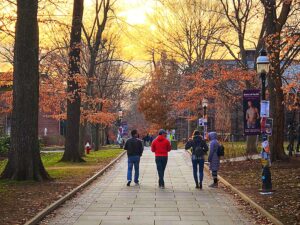The American Medical College Application Service (most commonly referred to as AMCAS, because that’s a mouthful), is a service run by the Association of American Medical Colleges (AAMC), and is the primary way students apply to medical schools. AMCAS is used by MD programs; DO programs have their own separate system which we will discuss in a different article. (Texas also has their own independent system, which will get its own article).
This application can seem overly complicated, and like most applications has many moving parts, requiring significant attention to detail. In this article, we’ll provide a complete guide to the AMCAS, and tell you everything you need to know to approach this application with confidence. Let’s get started!
Before Getting Started
There is some baseline information which is good to know before breaking down the specifics of AMCAS. First, understand that this application is like the Common App; you fill out the main information once, and it goes out to every school you apply to. This will not be the totality of your applications; each school has their own required supplemental essays and interviews.
You should also know that each school has their own deadlines, and should track those separately. Once you have submitted your application, processing may tak up to eight weeks; you will be able to check the status of your applications in AMCAS, to see when they are being processed or reviewed.
Beginning an AMCAS Application
You have to begin by (of course) creating an account. This may be done from the homepage of the website; clicking sign in will give you the option to create a new account. Once this is done, you can begin a new application.
You’ll begin with preliminary information; your name, citizenship, and birth info. You will also be assigned an AMCAS ID number. This is important, as you will need it when you contact admissions officers, so they can match you with your application. Write this down somewhere you will be able to find and reference it.
The next info you will need to enter is biographical information and colleges you attended. You need to complete this before moving on to the bulk of the application; it won’t let you proceed otherwise. The only thing of note here is that if you’ve ever had an academic violation, you will need to note that and compose a short statement discussing what happened. This may be up to 1,325 characters, which is around 200 words.
You will have to fill out all of your college coursework information. This is an annoyance, and we recommend doing this with your transcript in hand to make sure you don’t make any careless errors. Courses taken in the summer should be counted with the following year; in their system terms begin in the summer and end in the spring.
AMCAS separates your courses into two categories. Science courses are Biology, Chemistry, Physics, and Math (BCPM), while non science courses are everything else. You have a separate GPA calculated for each, which combine to create your total GPA. You are allowed to assign these yourself, though AMCAS may review and change your designations.
AMCAS requires an official transcript from every institution you have attended, which must be sent to them directly by each school. Once a transcript is received, it may not be updated later. If you want to update schools you are applying to about your courses and grades, you will need to send them a transcript from your school directly. This is not necessary in most cases.
The Work and Activities Section
Your extracurriculars are very important for medical school, and this is the section that allows you to discuss how you spend your time outside of class. You can list up to fifteen examples in this section, and are asked to highlight three which were the most meaningful to you.
Each activity must be assigned a category. The options for this are:
- Leadership – Not listed elsewhere
- Military Service
- Other
- Paid Employment – Medical/Clinical
- Paid Employment – Not Medical/Clinical
- Physician Shadowing/Clinical Observation
- Presentations/Posters
If none of these categories seem fitting for one of your activities, select other.
You will first enter the start and end dates for the activity, the name of the experience and organization, and a contact name for a mentor or supervisor, if applicable. You also have to enter the location where the experience occurred.
You have 700 characters total to describe what you did as part of the experience. This is significantly more than you had on the Common App, but is short of being a full essay; you’ll have a few sentences to describe your experience. There is a box you can check if this was one of your most meaningful experiences; if you do, you get another 1,325 characters to discuss it.
Letters of Recommendation
You will need to complete this section before submitting the AMCAS, but the letters themselves do not need to be attached in order to submit. You will need a separate entry for each letter source, describing who submitted it. There is space for ten letters in total to be attached.
You do not need to send each letter to each school; you can assign them separately. After you enter the needed information, AMCAS will allow you to generate letter request forms. These are sent to your letter writers, and include important information, like how they should submit the letters to AMCAS.
You will be able to check the status of all your letters in the application. For more information on how to request letters, see our article on that topic.
Adding Schools
Once you have added recommenders, the next page lets you select which medical schools you are applying to. You can search schools by name, or select them from a dropdown menu. Once you have selected your schools, you will be able to assign recommendation letters to them.
The AMCAS Essay
The personal statement is labeled as “Personal Comments” which does downplay somewhat the importance of what’s being asked of you. You can learn more about writing your personal statement in this article. Much like when you applied to undergrad, this essay will go out to every medical school you submit the AMCAS to.
You have 5,300 characters allotted to the essay. If you are applying to MD/PhD programs, you will have two additional prompts to answer on this page.
Standardized Test Scores
The final section of the application allows you to enter your standardized test scores, namely the MCAT. All MCAT tests you received a score on are released to AMCAS automatically; you need to know your date of testing to enter them into the form. You will also have a box to check if you plan to take the MCAT again. This is important, as it lets medical schools know whether or not to expect further scores from you when evaluating your application.
Once you have taken the MCAT, and received your scores, for the final time, make sure to update this section as well, to indicate no further scores are forthcoming.
You may also submit other standardized test scores on this page, such as the GRE or the LSAT.
Finalizing Your Application
Once all of that is complete, and you are ready to submit, you will need to read and authorize a number of forms. These count as a legal signature, and bind you to the terms. Make sure all of the information entered is correct before you submit, as your ability to edit it is quite limited afterwards.
Once you have accepted these, you need to pay your application fees before your application will be processed. You may do this via credit card.
After submission, you will only be able to edit the following information:
- ID Numbers
- Your name, gender, date of birth, and contact information
- Your next MCAT test date
- Designations of additional medical schools
- Letters of recommendation
It is possible to withdraw your AMCAS application after submission, if unexpected events preclude you from attending medical school next year, or if you are reconsidering the timing of your application. Once an application is withdrawn, you will be unable to continue applying to med schools during this application cycle. You can find the button to do this on the right side of the main menu.
AMCAS will not refund your processing fee if you withdraw your application. Individual medical schools may refund their application fees if their deadlines have not yet passed.
Final Thoughts
Medical school applications are a difficult process, but their centralized system for handling paperwork does make organization easier. Just as the Common App makes applying to colleges a streamlined process, so too do the centralized medical application systems enable thousands of students to apply to medical school each year.
We hope that this guide has told you everything you need to know to tackle the AMCAS with confidence. Of course, no one thing gets you into medical school, but the sum of all of the pieces of your application. If you want advice on a specific piece, or want to hear how we can help you with your applications, schedule a free consultation today.








